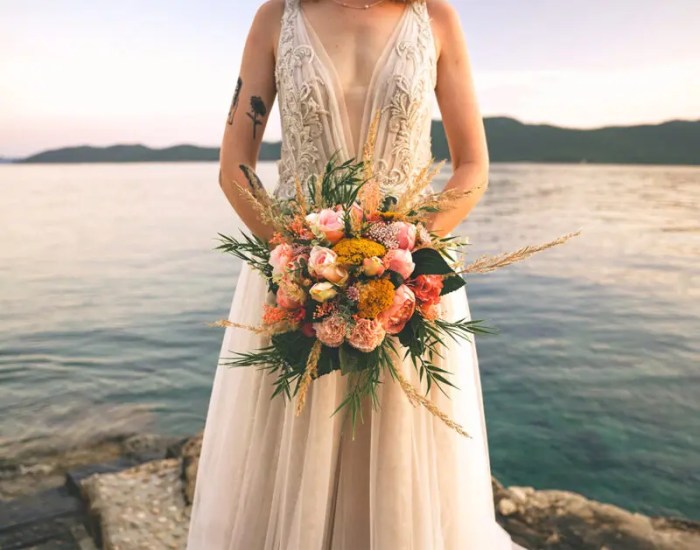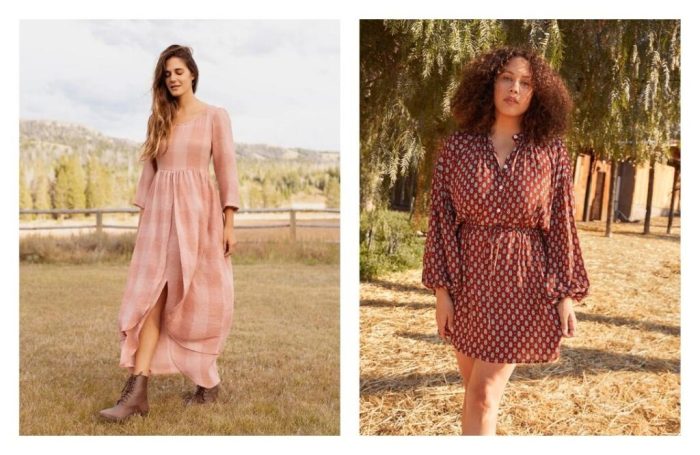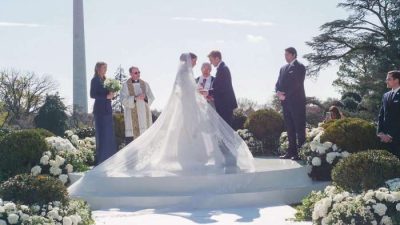Sustainable Wedding Dresses: A Guide to Eco-Conscious Choices: Dresses To Wear To A Wedding Sustainable

Source: mygreencloset.com
Dresses to wear to a wedding sustainable – Choosing a sustainable wedding dress is a beautiful way to celebrate your special day while minimizing your environmental impact. This guide explores the key aspects of selecting an eco-friendly gown, from understanding sustainable materials and ethical production to accessorizing and extending the life of your dress.
Defining “Sustainable” Wedding Dresses
A sustainable wedding dress prioritizes environmental and social responsibility throughout its lifecycle. This encompasses the materials used, the production methods employed, and the ethical sourcing of components. It moves beyond simply choosing a “natural” fabric; it considers the entire process, from farm to finished garment.
Several sustainable materials are commonly used in wedding dress construction. Organic cotton, grown without harmful pesticides and fertilizers, offers a breathable and soft alternative to conventionally grown cotton. Recycled fabrics, such as recycled polyester or silk, repurpose pre-consumer or post-consumer waste, reducing textile waste and minimizing the demand for virgin materials. Tencel, derived from sustainably harvested wood pulp, is known for its softness, drape, and biodegradable nature.
Each material presents unique advantages and disadvantages.
| Material | Sustainability Features | Pros | Cons |
|---|---|---|---|
| Organic Cotton | Grown without harmful pesticides and fertilizers; biodegradable | Soft, breathable, comfortable; relatively low environmental impact compared to conventional cotton | Can be more expensive than conventional cotton; may require more water depending on farming practices; prone to wrinkles |
| Recycled Polyester | Made from recycled plastic bottles; reduces reliance on virgin materials | Durable, wrinkle-resistant, water-resistant; reduces landfill waste | Not biodegradable; manufacturing process may still have some environmental impact |
| Tencel (Lyocell) | Made from sustainably harvested wood pulp; biodegradable and compostable | Soft, drapes well, breathable; low environmental impact | Can be more expensive than other options; may not be as durable as some synthetic fabrics |
Dress Styles for Sustainable Weddings
Sustainable wedding dresses are available in a wide range of styles, accommodating various preferences and wedding themes. Whether your wedding is formal or informal, there’s a sustainable option that complements your vision. The focus remains on the materials and production, not just the aesthetic.
- A-line Gown: A classic and flattering silhouette easily adaptable to sustainable fabrics like organic cotton or Tencel.
- Sheath Dress: A sleek and modern style suitable for both formal and informal settings, particularly effective in recycled fabrics.
- Empire Waist Gown: This style accentuates the waistline and flows gracefully, ideal for showcasing sustainable lace or embroidered details.
- Bohemian Dress: Often made with natural fibers like organic cotton or linen, this style embodies a relaxed and eco-conscious aesthetic.
- Simple Slip Dress: Minimalist and elegant, this style allows the beauty of the sustainable fabric to shine.
Silhouettes like A-line, sheath, and empire waist can all be made sustainably by simply choosing eco-friendly materials and ethical production methods. The key is in the choice of fabric and the brand’s commitment to sustainable practices.
Sourcing and Ethical Considerations
Ethical sourcing is paramount in the pursuit of sustainable wedding dresses. This means considering the entire supply chain, from the origin of the materials to the working conditions of those involved in production. Transparency and traceability are crucial in ensuring ethical practices.
Three key ethical considerations are fair wages for garment workers, safe working conditions in factories, and the avoidance of child labor. These are fundamental to ensuring that the creation of your dress does not come at the expense of human well-being.
| Brand/Designer | Material Sourcing | Production Practices | Fair Labor Practices |
|---|---|---|---|
| [Brand Example 1] | [Details on material sourcing, e.g., organic cotton from certified farms] | [Details on production methods, e.g., low-impact dyeing techniques] | [Details on fair wages and working conditions, e.g., certified by a fair trade organization] |
| [Brand Example 2] | [Details on material sourcing] | [Details on production methods] | [Details on fair labor practices] |
| [Brand Example 3] | [Details on material sourcing] | [Details on production methods] | [Details on fair labor practices] |
Accessorizing Sustainably
Extending the sustainable ethos to your wedding accessories ensures a cohesive and responsible approach to your overall look. Consider materials like recycled metals, ethically sourced gemstones, and plant-based materials for jewelry. Shoes made from sustainable leather or recycled materials are also available. Headpieces can be crafted from recycled fabrics or natural flowers.
Sustainable jewelry materials, such as recycled gold and silver, minimize the environmental impact of mining. Ethically sourced gemstones ensure that their extraction does not harm communities or ecosystems. Plant-based materials like wood or recycled plastic offer beautiful and eco-friendly alternatives.
A complete sustainable wedding outfit might include a Tencel A-line gown, recycled silver jewelry with ethically sourced gemstones, shoes made from sustainable leather, and a headpiece crafted from dried flowers.
After the Wedding: Sustainability Beyond the Dress, Dresses to wear to a wedding sustainable

Source: sustainablejungle.com
Extending the lifespan of your sustainable wedding dress is crucial to maximizing its environmental benefits. Proper cleaning and storage will help preserve its quality. Consider dry cleaning or hand washing depending on the fabric, and store it in a breathable garment bag to prevent damage.
Donating or reselling your wedding dress promotes circularity, ensuring it finds a new life rather than ending up in a landfill. Platforms specializing in pre-owned wedding dresses provide avenues for reselling. Donating to a charity or bridal consignment shop allows others to enjoy your beautiful gown.
A visual infographic could depict the lifecycle of the dress: from sustainable material sourcing and ethical production, to the wedding day, and finally, to donation or resale, highlighting the reduced environmental impact compared to a conventionally made dress. The infographic would emphasize the circularity and longevity of the sustainable choice.
Choosing sustainable dresses for a wedding is a thoughtful way to celebrate responsibly. The level of formality, however, dictates the style; for black-tie affairs, you might explore elegant options, perhaps finding inspiration in the stunning selection of dresses for black tie weddings available online. Remember, even with formal attire, prioritizing sustainable materials like organic cotton or recycled fabrics keeps your wedding guest look both stylish and environmentally conscious.
Budgeting for Sustainable Choices
Finding affordable sustainable wedding dresses is possible with careful planning and research. While some sustainable options may have a higher initial cost, the long-term value and reduced environmental impact often justify the added expense. Consider renting a sustainable dress or purchasing a pre-owned gown as cost-effective alternatives.
Sustainable wedding dresses can sometimes cost more than conventionally made dresses due to the higher cost of sustainable materials and ethical production. However, the long-term value, reduced environmental impact, and ethical considerations often outweigh the initial price difference.
- Explore rental options for sustainable wedding dresses.
- Shop for pre-owned or vintage sustainable gowns.
- Consider simpler dress designs to reduce material costs.
- Support smaller, ethical brands or designers.
- Set a realistic budget and prioritize sustainable materials.
Top FAQs
What if I can’t find a sustainable dress in my budget?
Consider renting a sustainable dress, buying secondhand, or focusing on sustainable accessories to incorporate eco-friendly elements within your budget.
How can I ensure the dress remains sustainable after the wedding?
Proper cleaning and storage are crucial. Consider reselling, donating, or repurposing the dress to extend its lifespan and minimize waste.
Are all “sustainable” dresses truly sustainable?
Look for certifications (e.g., GOTS, OEKO-TEX) and transparency from brands regarding their sourcing and production processes. “Sustainable” is a broad term, so thorough research is vital.
Can I find sustainable wedding dresses in plus sizes?
Yes, many sustainable brands offer inclusive sizing. Research brands specifically known for their commitment to body positivity and diverse sizing.


